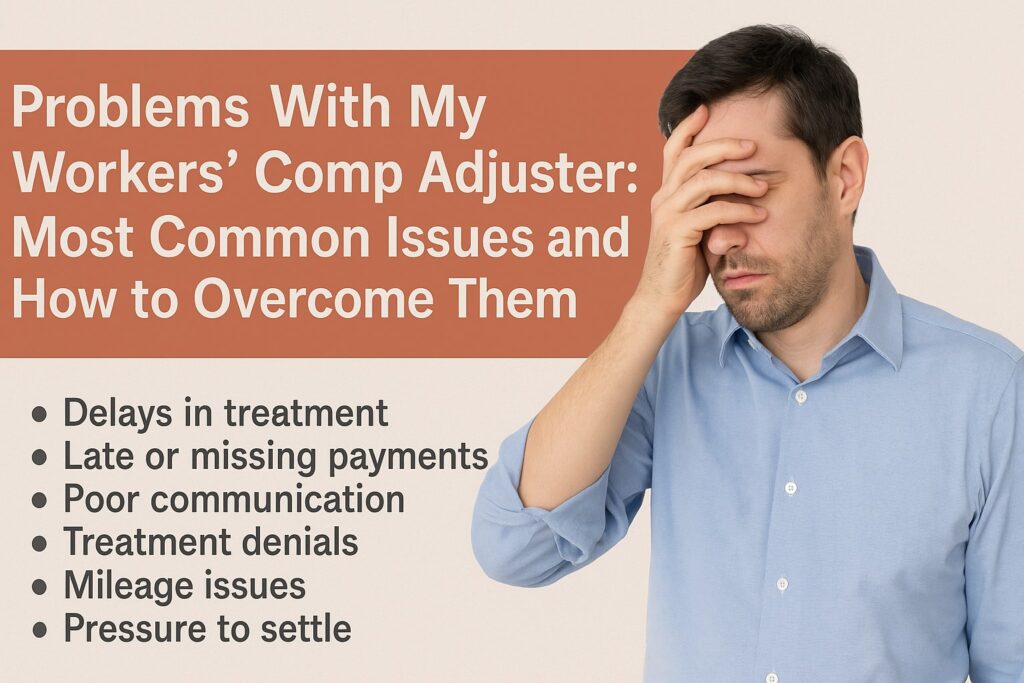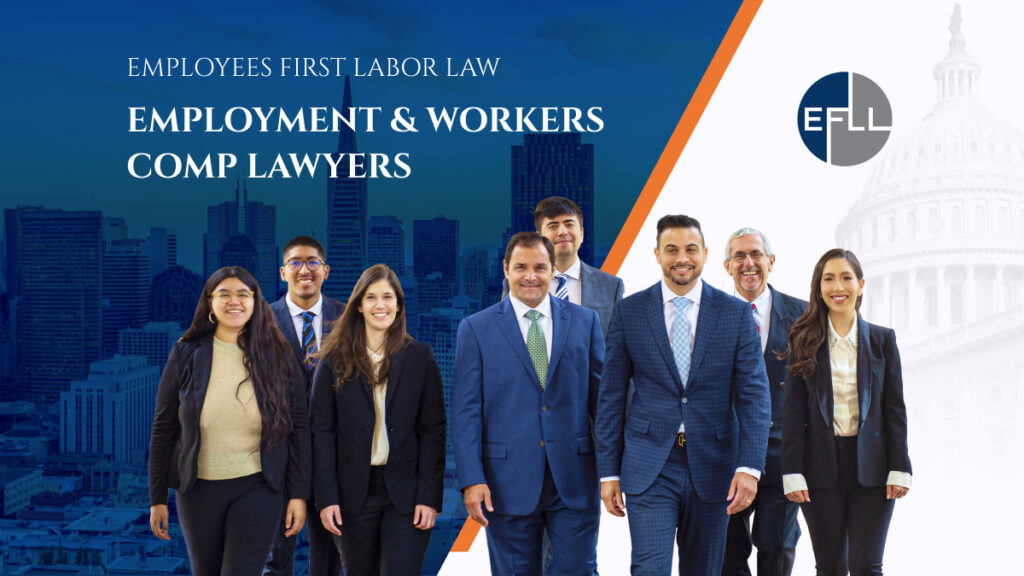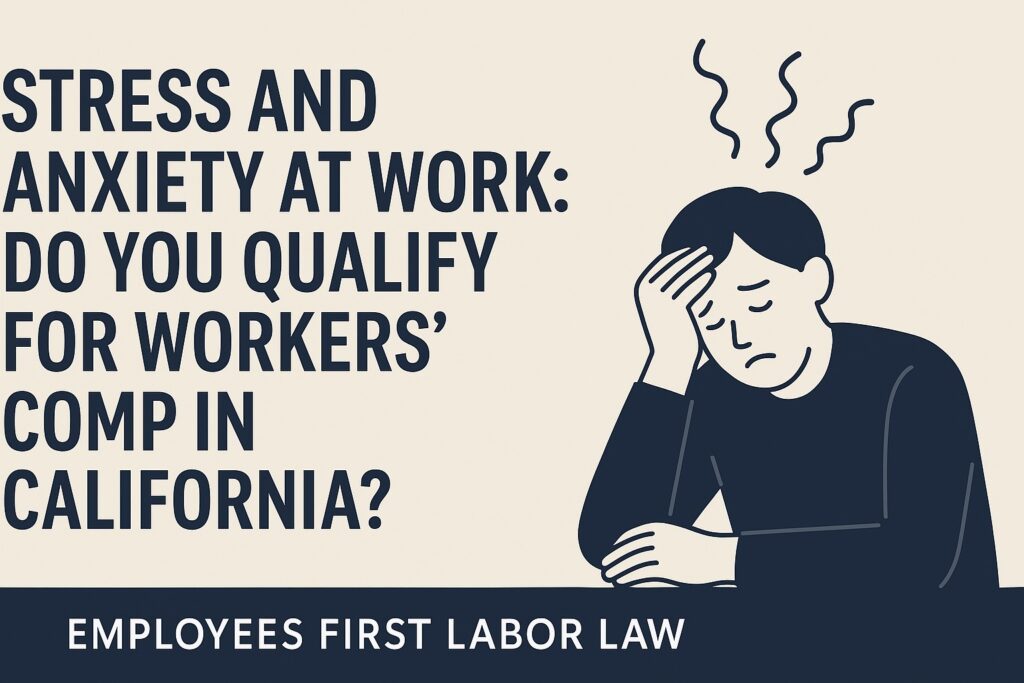
If you’ve filed a workers’ compensation claim in California, chances are you’re dealing with a claims adjuster—someone hired by your employer’s insurance company to manage your case. While some adjusters are responsive and professional, many injured workers report frustrating and even obstructive behavior from their adjuster.
At Employees First Labor Law, we’ve heard it all: ignored calls, delayed payments, denied treatments, and misleading information. The unfortunate truth is this: your adjuster doesn’t work for you—they work for the insurance company.
Here’s a breakdown of the most common problems injured workers face with their workers’ comp adjuster—and what you can do to protect yourself.
1. Delays in Approving Medical Treatment
One of the most frequent complaints is unnecessary delays in getting medical care approved. Your doctor may recommend physical therapy, surgery, diagnostic testing, or specialist visits—only to have the adjuster stall or deny it.
Why This Happens:
- Insurance companies save money by delaying care
- Adjusters may claim the treatment is not “medically necessary”
- Delays may be used to pressure you into early settlement
How to Overcome It:
- Make sure your doctor’s request is in writing and properly submitted via RFA (Request for Authorization)
- Demand written responses and timelines
- File for an expedited hearing if treatment is being unreasonably delayed
- Contact a workers’ comp attorney to push the issue forward
📖 Related: What Medical Treatment Is Covered in Workers’ Comp?
2. Late or Missing Disability Payments
If you’re off work and depending on temporary disability (TD) payments, late checks can put you in serious financial jeopardy. Some adjusters issue payments late, inconsistently, or fail to calculate your wage rate correctly.
Why This Happens:
- Miscommunication or failure to process doctor reports on time
- “Convenient” errors that reduce the amount paid
- Adjusters may be overwhelmed or intentionally slow
How to Overcome It:
- Keep a log of all doctor appointments and disability statuses
- Request a benefits printout showing all payments made
- Demand penalties for late payments under Labor Code § 4650
- Consult a lawyer to request audit and enforcement
📖 Related: Temporary Disability Benefits: What You Need to Know
3. Poor Communication or No Responses
Many workers report that their adjuster won’t return calls, emails, or answer questions. This can delay treatment, prevent access to benefits, and leave you in the dark about your own case.
Why This Happens:
- Adjusters may be juggling hundreds of cases
- Some use silence as a tactic to frustrate injured workers
- They hope you’ll give up or stop pushing for benefits
How to Overcome It:
- Always communicate in writing (email or certified mail)
- Document all attempts to contact them
- Notify the California Division of Workers’ Compensation (DWC)
- Hire a lawyer to handle communication directly and hold them accountable
4. Denied Treatment Based on Utilization Review (UR)
Your doctor may request treatment, but the adjuster sends it to Utilization Review, where it gets denied—often by a doctor who’s never examined you.
Why This Happens:
- UR doctors are paid to deny care deemed not “medically necessary”
- Adjusters often rely on UR denials to avoid liability
How to Overcome It:
- File for Independent Medical Review (IMR) within 30 days
- Ask your treating physician to submit a strong medical justification
- Retain legal help if you’re denied care multiple times
📖 Related: Primary Treating Physician and How to Change Doctors
5. Disputes Over Mileage or Reimbursement
Some adjusters refuse to pay mileage reimbursements for travel to medical appointments—or make you jump through hoops for small payments.
How to Overcome It:
- Submit the DWC Form 395 for every trip
- Track your mileage and attach supporting documents
- Request payment within 60 days—or demand penalties for failure
📖 Related: Mileage Reimbursement in Workers’ Comp (California Guide)
⚖️ 6. Pressure to Settle Quickly and Cheaply
Adjusters may encourage you to settle before your condition stabilizes (reaches Maximum Medical Improvement, or MMI). They may lowball your case or promise fast money without explaining your future rights.
Why This Happens:
- The faster and cheaper they close your case, the more they save
- They may avoid responsibility for future medical care or disability ratings
How to Overcome It:
- Never sign a Compromise & Release (C&R) without understanding the full implications
- Review your Permanent Disability (PD) rating with a lawyer
- Demand medical reports and full settlement calculations
📖 Related: How and When Workers’ Comp Offers a Settlement
Let EFLL Deal with the Adjuster—You Focus on Healing
You’re recovering from a work injury. You shouldn’t have to chase down an adjuster, fight over every treatment, or worry if you’re being shortchanged. At Employees First Labor Law, we know the tricks and tactics adjusters use—and we shut them down.
We’ve helped thousands of injured California workers secure:
- Medical care without delays
- Maximum wage-loss payments
- Permanent disability awards
- Fair, full settlements

Summary: Know Your Rights and Enforce Them
Common Adjuster Problems:
- Delays in treatment
- Late or missing payments
- Poor communication
- Treatment denials
- Mileage issues
- Pressure to settle
What You Can Do:
- Document everything
- Use written communication
- Know your legal rights
- Get help from an experienced workers’ comp attorney
Contact EFLL for a free consultation today.
We’ll fight to get your treatment approved and ensure your recovery isn’t left in the hands of an adjuster.



